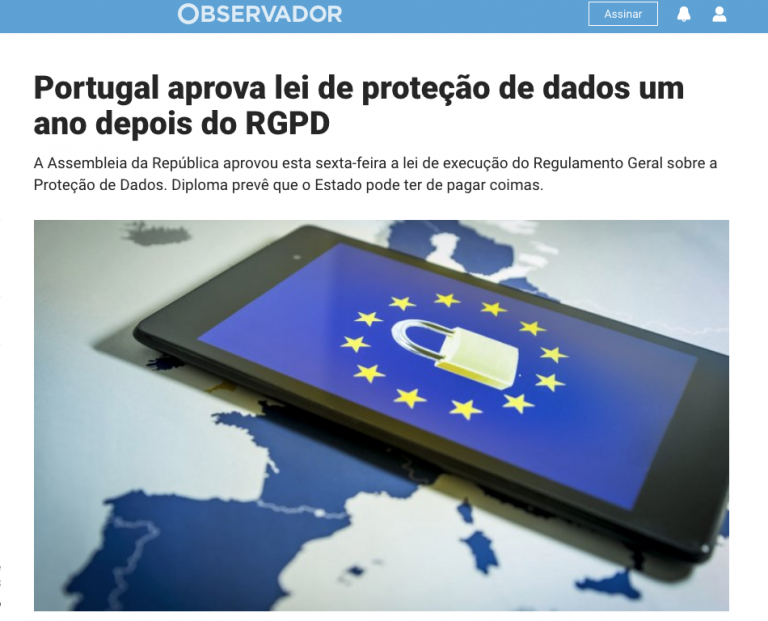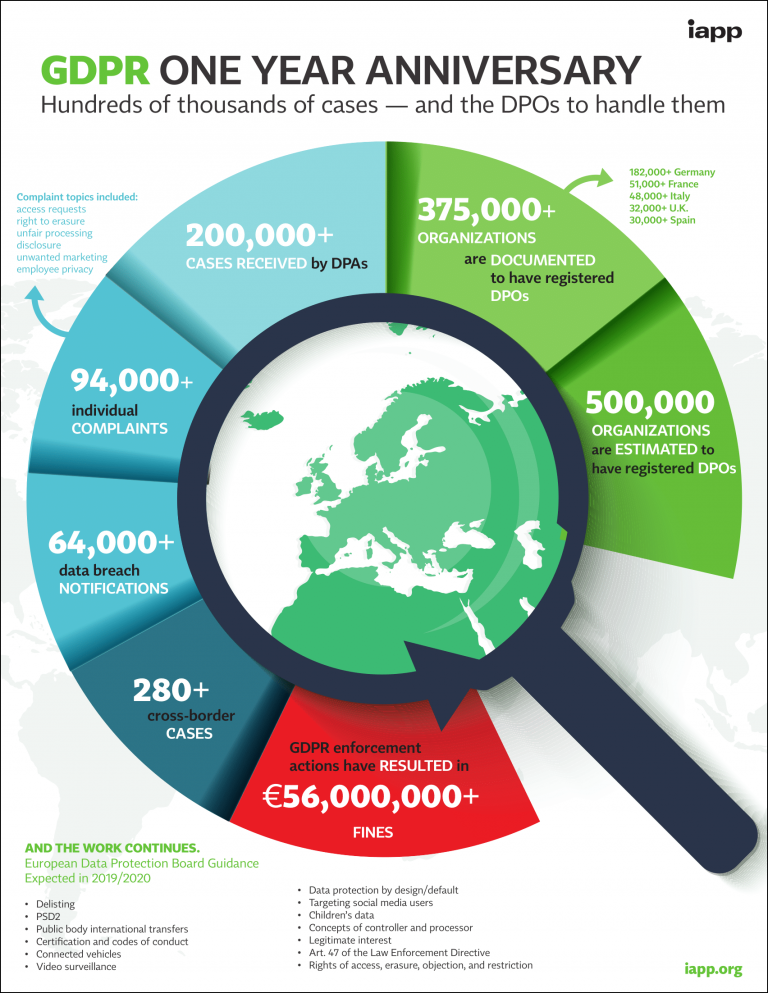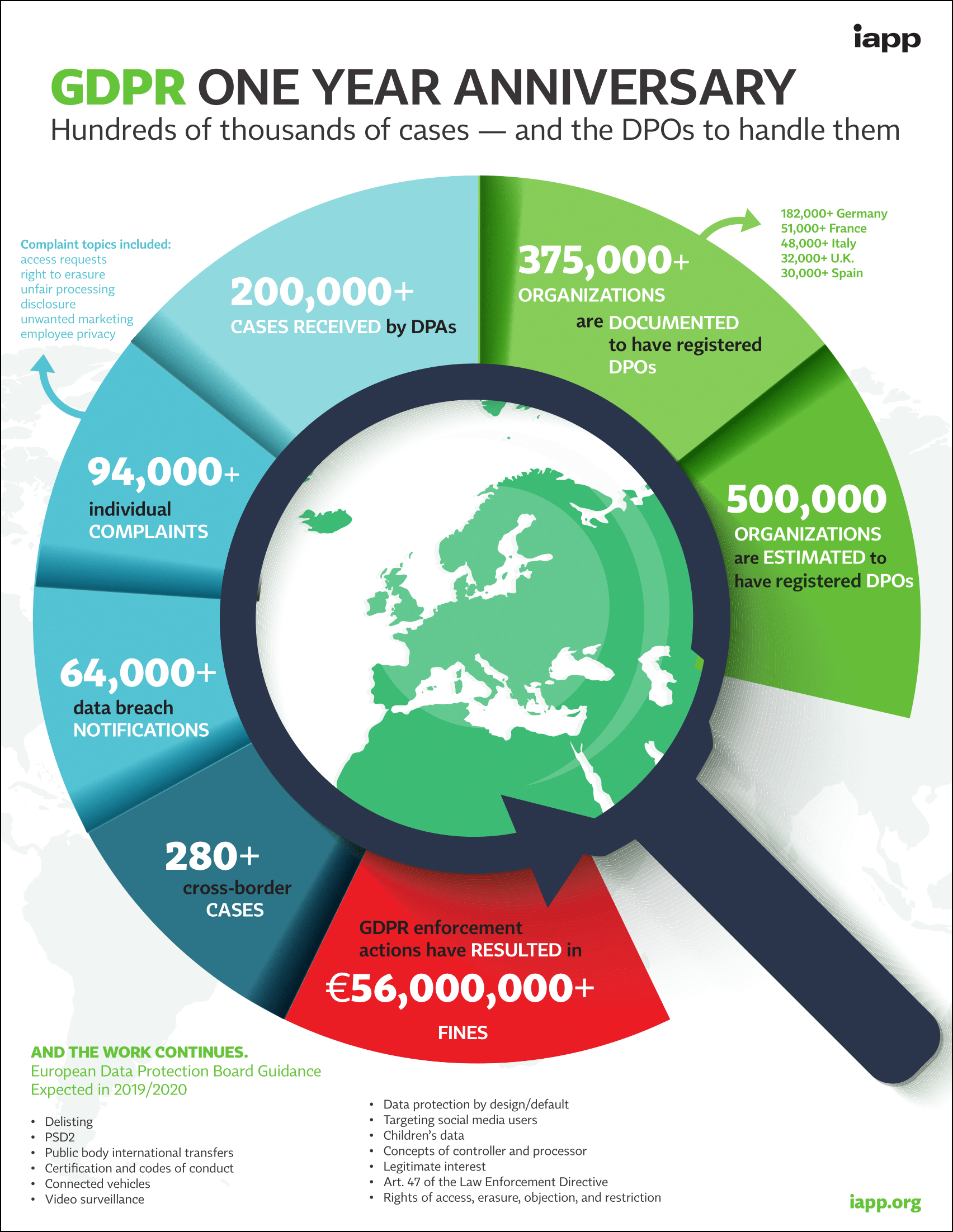As 2019 draws to a close, it’s time to take a look at what has happened with the GDPR over the past twelve months.
On May 25th this year, we celebrated the first anniversary of the implementation of the regulation.
At the time, some organizations were still struggling to both understand and comply with GDPR and its complexities. The primary objective of the GDPR is to give citizens back control of their personal data. GDPR is a regulation that requires businesses to protect the personal data and privacy of EU citizens for transactions that occur within EU member states. And non-compliance could cost companies dearly.
There are strict requirements on the way businesses collect, store and manage personal data. GDPR provides citizens of the EU with greater control over their personal data and assures that their information is being securely protected across Europe, regardless of whether the data processing takes place in the EU or not. Personal data can be a name, email, address, date of birth, personal interests, unique identifiers, digital footprints and more.
ICO
In the UK, the Information Commissioners Office (ICO) are the governing body that oversees GDPR. They offer advice and guidance, promote good practice, carry out audits and advisory visits, consider complaints, monitor compliance and take enforcement action where appropriate.
GDPR replaced the 1995 Data Protection Directive and aims to strengthen and unify data protection for all individuals within the European Union.
It is the biggest overhaul of personal data privacy rules since the launch of the internet.
GDPR compliance
Businesses need look closely at their data and how they handle it. There are many things a company must do in order to be compliant with GDPR.
Know your data. You need to demonstrate an understanding of the types of personal data (for example name, address, email, bank details, photos, IP addresses) and sensitive (or special category) data (for example health details or religious views) you hold, where they’re coming from, where they’re going and how you’re using that data.
Identify whether you’re relying on consent to process personal data. If you are (for example, as part of your marketing), these activities are more difficult under the GDPR because the consent needs to be clear, specific and explicit. For this reason, you should avoid relying on consent unless necessary.
Look hard at your security measures and policies. You need to update these to be GDPR-compliant, and if you don’t currently have any, get them in place. Broad use of encryption could be a good way to reduce the likelihood of a big penalty in the event of a breach.
Access requests have one month to be dealt with. Under GDPR, citizens have the right to access all their personal data, rectify anything that’s inaccurate and object to processing in certain circumstances, or completely erase all their personal data that you may hold. Each request carries a timeframe and deadline of one month (which can only be extended in mitigating circumstances), from the original date of request.
Employees need to undergo training and serious breaches need to be reported within 72 hours. Ensure your employees understand what constitutes a personal data breach and build processes to pick up any red flags.
It’s also important that everybody involved in your business is aware of a need to report any mistakes to the Data Protection Officer (DPO) or the person or team responsible for data protection compliance, as this is the most common cause of a data breach.
Conduct due diligence on your supply chain. You should ensure that all suppliers and contractors are GDPR-compliant to avoid being impacted by any breaches and consequent penalties. You also need to ensure you have the right contract terms in place with suppliers (which puts important obligations on them, such as the need to notify you promptly if they have a data breach.
Create fair processing notices. Under GDPR, you’re required to describe to individuals what you’re doing with their personal data.
Decide whether you need to employ a Data Protection Officer (DPO). Most small businesses will be exempt. However, if your company’s core activities involve ‘regular or systematic’ monitoring of data subjects on a large scale, or which involve processing large volumes of ‘special category, you must be advised and supported by a Data Protection Officer (DPO).
Fines
Worryingly, 58% of surveyed businesses worldwide failed to address requests made from individuals seeking to obtain a copy of their personal data as required by the GDPR within the one-month time limit set out in the regulation, according to updated research from Talend.
With an increasing use of data and new technologies – facial recognition and AI – by the public sector to improve the citizen experience, the need for more integrated data governance is a must-have for 2020 and beyond.
In the most serious cases, organisations can be fined up to €20m or 4% of their worldwide annual revenue – whichever is larger.
But regulators are supposed to take into account whether the offending body co-operated with their inquiry, any past offences and whether the infringement was deliberate or a mistake, among other factors, when deciding the amount.
The most recent GDPR fine was earlier this month A German internet service provider faces a €9.6m ($10.6m; £8m) fine after being accused of failing to carry out tough enough customer ID checks.
Germany’s data protection watchdog said anyone who called 1&1 Telecom could get extensive personal information about someone else solely by giving their name and date of birth.
The BfDI (Federal Commissioner for Data Protection and Freedom of Information) acknowledged that 1&1 Telecom had been “transparent and very co-operative” and had also taken steps to improve its practices.
But the watchdog said the sum was still justified on the basis that its entire customer base had been put at risk.
In October, the same regulator punished a German property company with a bigger €14.5m fine for holding on to people’s personal data for longer than was necessary.
Just last week, a London-based pharmacy has been fined £275,000 after it breached data protection laws by failing to safely store sensitive patient information.
Doorstep Dispensaree, based in Edgware, north London, stored approximately 500,000 documents containing care home patients’ names, addresses, dates of birth, NHS numbers, medical information and prescriptions in its courtyard, according to the ICO.
Doorstep Dispensaree claimed the documents were securely stored because the courtyard was locked. However, the ICO did not accept this reasoning and said the pharmacy itself admitted that residents in the flats above the branch could access the area through a fire escape.
“The careless way Doorstep Dispensaree stored special category data failed to protect it from accidental damage or loss. This falls short of what the law expects, and it falls short of what people expect,” ICO director of investigations Steve Eckersley said.
The ICO has given the pharmacy a deadline of January 17 to pay the fine.
Round-up
2019 is the year that GDPR got its teeth. Companies, including Google, British Airways and Marriott International, were handed record fines for intentional or negligent misuse of data.
If you thought the new law was a paper tiger, think again. Businesses that haven’t taken compliance seriously or aren’t sure whether their compliance efforts are sufficient would be wise to react accordingly.
This was the year that businesses needed to get their house in order and make sure that they had effective GDPR awareness training for all employees in place.
Cyber security continues to be important and vital that appropriate measures are taken to make sure businesses are protected.
What is certain, is that 2020 will be an interesting – and busy – year.












